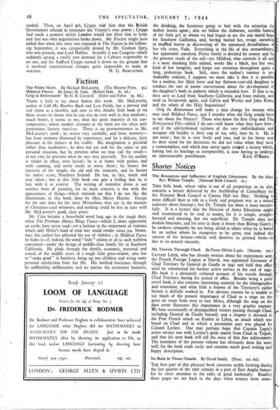Fiction
Grig in Retirement By H. B. Creswell. (Faber and Faber. 9s. 6d.) THERE is little to say about fiction this week. Mr. McLaverty, author of Call My Brother Back and Lost Fields, has a proved and real talent as a novelist, and now in this slender little book of six Short stories he shows that he can also do very well in that medium ; much better, it seems to me, than the great majority of his con- temporaries, whose modish attempts at the form are too often only pretentious literary exercises. There is no pretentiousness in Mr. McLaverty's work ; he writes very carefully, and from memory— but from memory illumined by experience, and by a delicate, lyric pleasure in the texture of the visible. His imagination is pictorial rather than meditative ; he does not yet seek for the cause in any personal situation, but he presents what we may call the result— at any rate, he presents what he sees very precisely. Yet his outline is tender in effect, even lyrical ; he is at home with pathos and with cunning, and never needs to stress them ; he knows the interests of the simple, the old and the innocent, and he knows his native scene, Northern Ireland. He has, in fact, much and true talent ; but in this little book one gets a feeling that he is lazy with it or evasive. The writing of narrative prose is not another form of painting, for its main concern is not with the appearances of things—which reminds me that I do not like the illustrations in this book, done by Miss Mercy Hunter. Except for the one done for the story Moonshine, they are in the manner of Christmas-card whimsies, and nothing could be less in. tune with Mr. McLaverty's good, clear prose.
Mr. Cain became a household word long ago in the tough days, when The Postman Always Rings Twice—which I, alone apparently on earth, have never read—set a fashion in the enjoyment of violence which only Hitler's kind of total war could render vieux jeu. Nowa- days this author has adjusted his use of violence ; in Mildred Pierce he hides it—if, indeed, the word " hide " relates at all to such ruthless coarseness—under the design of middle-class family life in Southern California. He plods through the details, economic, maternal and sexual, of the middle years of a tough little grass-widow, who has to " make good " in business, bring up two children and wring some personal satisfaction from her life. His method fascinates through its unflinching deliberation, and we pursue the restaurant business, the drinking, the licentious going to bed with the attention the author insists upon ; also we follow the elaborate, terrible funeral of the little girl in whom we had begun to see the one moral hope for Southern California, and, having buried her, resign ourselves in muffled horror to discovering all the unnatural dreadfulness of her vile sister, Veda. Everything in the life of this extraordinary, but apparently standard, Pierce family is decided by money and by the grossest needs of the self—yet Mildred, who controls it all and is a most shocking little animal, works like a black, has her own kind of low integrity, and keeps our attention throughout quite a long, pedestrian book. Still, since the author's manner is un- shakeably realistic, I suppose we must take it that it is possible for a. mother, her illicit lover and her thirteen-year-old daughter to conduct the sort of jocose conversation about the development of the daughter's body in puberty which is recorded here. If that is so, then save us Lord from Southern California and from realism, and send us Savonarola again, and Calvin and Wesley and John Knox, and the whole of the Holy Inquisition!
Greg In Retirement will make a nice change for anyone who may read Mildred Pierce, and I wonder what old Grig would have to say about the Pierces? Those who know the first Grig and Ths Honeywood File—which I do not—will know what they have here ; and if the old-fashioned raciness of the very individualistic and arrogant old builder is their cup of tea, why, here he is. He is not mine ; but he is very lively and true, and in his bossy way he does stand for the decencies we did not value when they were a commonplace, and which may never again control a society which, having lost its bearings so irresponsibly, is now having to undergo






















 Previous page
Previous page